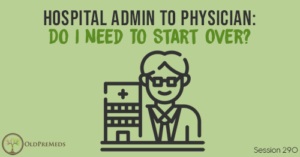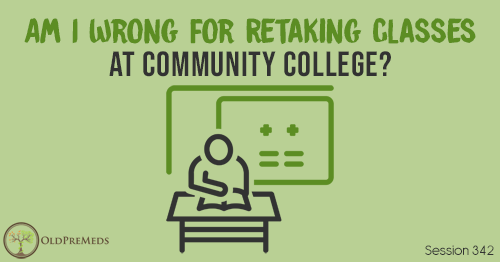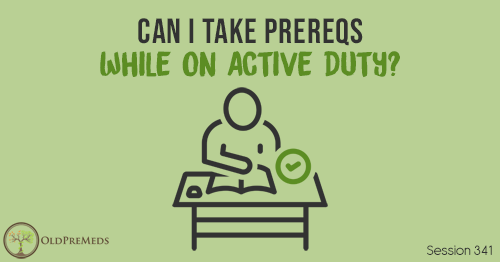Apple Podcasts | Google Podcasts
Session 290
This nontrad has experience as a hospital administrator, and now thinking about changing careers and becoming a physician. But should they start over?
Questions answered here on the podcast are taken directly from the Nontrad Premed Forum over at premedforums.com. Please go ahead and register for an account, ask your question, and have fun with the community.
Also, please be sure to check out all our other podcasts on Meded Media as we try to bring you as many resources as you need on this journey.
Listen to this podcast episode with the player above, or keep reading for the highlights and takeaway points.
[01:00] The MCAT Minute
The MCAT Minute is brought to you by Blueprint MCAT.
How soon is too soon to start studying for the MCAT? Can you study as a first-year or a second-year? With Blueprint MCAT’s new flashcard set and flashcard tool, you definitely can! It’s one of the easiest ways to start preparing for the MCAT content and material for free. They have over 1,600 flashcards for you on a brand new Spaced Repetition platform.
[02:09] OldPreMeds Question of the Week
“I’ve been so grateful to have found this forum over the last few weeks! Now, it’s time to address my current status and pre-med journey.
Quick stats:
– Former D1 College Athlete
– BS Public Health
– MS Healthcare Admin
– Former University prof (healthcare systems and medical ethics)
– Professor for Study Abroad tour of the Italian Healthcare System (1-semester course and 3 weeks in Italian hospitals)
– 200 hours of ED volunteering in Undergrad and 400-hour Graduate internship in Surgical Services and Ops
– 3.2 Undergraduate GPA/2.0 Science (very few science courses but the ones I did take are Cs and Ds with no upward trend)
I’m currently a Patient Safety and Risk Manager at a large teaching hospital. I directly report to the Chief Medical Officer who doubles as a practicing surgeon. Due to my current position, I have unlimited access to shadowing and exposure to all specialties.
My plan is to do a DIY postbac and start completely from scratch (chem101 and beyond).
My burning questions:
– Are online classes still acceptable due to COVID? All universities in my area are still online indefinitely. But I know my state will always take the more conservative route and continue to delay in-person later than other states.
– Should I take “extra” courses like anatomy and multiple bios to boost my GPA? Especially since it’s clear I’ve struggled with sciences in the past
– Does my current job help my application stand out?
– What else am I missing that I can begin to tackle?”
[04:54] Start with the Basics
The best part about this question is that your 2.0 science GPA is only a couple of classes. So that science GPA will hopefully move very quickly. This student has thought through everything very well starting at Chem 101. So start with the basics.
Get your feet wet with taking science courses because those Cs and Ds at this point in your game will hurt.
Start with one to two courses. Start very light. It sounds like it’s been a while since you’ve been in school. Take some time to do science. Learn study habits for the particular courses that you’re going to be taking in that moment.
'Your study habits or how you study, is going to potentially change course to course. So you can't get too rigid as you go through this process.'Click To Tweet[06:01] What’s Missing Here
As you’re doing that, yes, shadow all the physicians that you have access to. The one key thing missing here is some clinical experience where you’re interacting directly with patients in some clinical way.
It doesn’t mean you’re the one doing things to the patients. But they are the patient in a hospital or a nursing home. It could also be in their own home if you’re a caregiver, whatever that setting is.
There are basic clinical experiences such as being an EMT, or a medical assistant, a CNA, phlebotomist. But then there are other ones on top of that.
Remember, it doesn’t have to be a traditional clinical setting. But they are a patient and you are taking care of them. You’re giving them water, you’re talking with them, you’re giving them a blanket. You’re interacting with them and you’re helping ease their fears and concerns and anxiety.
'Remember, it doesn't have to be a traditional clinical setting. But they are a patient and you are taking care of them.'Click To Tweet[07:13] Leverage Your Network
It sounds like they potentially have access to those types of experiences as well. It’s just going to be a matter of letting them know that you want to go to medical school and you need some experience. Then ask them if you could do this or that.
When you have that network and you’re already a built-in person in the hospital, then your access to things increases exponentially.
[07:46] Should You Take Extra Courses? Are Online Courses Fine?
Slow down for that. Start with the basics. Build a foundation. This student asked this question in March of 2021 and it’s now October of 2021. So we’re getting to this question a little bit later. Most, if not all schools, are back in person.
Most medical schools prefer or even require in-person courses moving forward. So just be careful with that.
'As schools are opening up undergraduate schools are opening back up, the medical schools are going to want in-person courses.'Click To TweetDon’t rely on the idea that because of COVID, you can take the courses online now. Just be careful with that.
[08:55] How to Stand Out?
If you’ve followed me for any period of time, you know that I don’t really like this question because I don’t think applicants “stand out” with anything in their application. There are things in an application that are interesting. And as a human being, I want to talk about those things. But it doesn’t stand out.
'What stands out is that human-to-human connection.'Click To TweetInteresting things in your resume build that connection. And that connection is what hopefully builds the memories that the admissions committee member is going to remember you by.
Just be careful with having that line of thinking where you’re doing things to stand out. Instead, do the things you want to do and you’re passionate about. Because that’s what’s ultimately going to help you stand out. And because the connection that you build through writing and talking about that experience is what really stands out.
[10:09] Anything Else?
Being a student-athlete is great and your passion for being a student-athlete will come through in an application through your writing and talking. And people want to talk to you about that. That helps you “stand out,” but again, it’s just the passion that comes from it. Hopefully, you like your current job and you’ll be passionate about writing and talking about that.
Put the story together. Talk about what that pivot point was for you when writing your personal statement.
As a nontraditional student, you’re coming to this a little bit later. And you’ll have to figure out how to talk about that. Outside of that, though, you’ve done a great job and figuring out kind of the next steps for you.
So take it slow, do well in your classes, do well on the MCAT and apply to medical school, and lean on that network around you. Let them know that you’re applying to medical school. Maybe some of them are on the admissions committee, and maybe one of them will write you a letter of recommendation.
'This world is very much who you know who you're connected to your network.'Click To TweetMany students are scared to tell people they’re applying to medical school, either for fear of losing their job or for fear of failure. They’re worried about being laughed at if they don’t get in. So have no fear. No one’s going to laugh at you for not getting in, they’re going to care for you and want to help you and help you figure it out. So tell as many people as possible.












